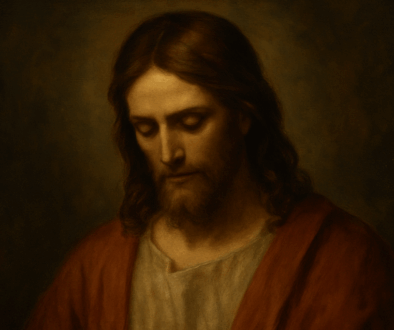I Give Up: The Collapse That Became a Door
I’ve been trying for a long time.
Trying to be good.
Trying to be worthy — of the space I take up, of the air I breathe.
Trying to fix others so I feel useful.
Trying to save others to mask the fact that I need saving.
Trying to run from myself.
Trying to do the right thing.
Trying to project what I want to be.
Trying to hold myself together.
Trying to hold my family together.
Trying to hold my community together.
I give up.
It doesn’t work.
None of it.
I’ve been living like it’s all on me — like I have to carry it all, like I have to be enough.
It’s what Kierkegaard called the ethical stage — the life of integrity, responsibility, striving to live rightly before God and others.
And it’s noble. But eventually, it cracks.
Because it’s still self-powered.
Still trying to earn what can only be received.
That’s when Camus started to make sense.
“There is but one truly serious philosophical problem, and that is suicide.”
— Albert Camus
Not because he wanted to die, but because he saw through the illusions.
When life collapses, when effort breaks, when meaning thins out —
you’re left with a choice: despair or revolt.
Camus chose revolt — a kind of lucid resistance.
Not moral superiority. Not hope. Just choosing to live, eyes open, in the face of the absurd.
But even that, eventually, feels hollow.
Because revolt still ends with you. Alone. Facing the silence.
Kierkegaard spoke of a third stage — the religious.
Not religion as duty or performance.
But surrender.
The leap of faith.
The collapse into paradox.
Not because it makes sense —
but because you’ve come to the end of yourself.
That’s when Paul’s words finally landed:
“All are justified freely by his grace, through the redemption that came by Christ Jesus.”
— Romans 3:24
Justified. Freely.
By grace.
Through redemption — a ransom paid.
Not earned.
Not performed.
Given.
So here I am.
Not climbing my way to peace.
Not proving my worth.
Not pretending I’ve got it together.
Just collapsing — not into the void, but into grace.
Moving On from the Ethical
I tried to live the ethical life, as Kierkegaard described.
Because the aesthetic life — all distraction and pleasure — left me hollow.
So I turned to virtue, to meaning, to being good.
But maybe the ethical life numbs too — just in a more respectable way.
“The ethicist has discovered his self and won it. But in the very act of winning it, he finds that it is insufficient.”
— Søren Kierkegaard, Stages on Life’s Way
I was performing — not grounded.
Living in bad faith, as Sartre might say.
“Bad faith seeks to affirm what one is, while fleeing from what one is.”
— Jean-Paul Sartre, Being and Nothingness
I had become, as Augustine wrote, incurvatus in se — curved inward on myself.
The problem, the solution, the burden, the hope — all centered in me.
Until I broke.
Collapse as Surrender
But collapse didn’t feel poetic.
It felt like my soul quietly stepped back.
Like my body refused to be used as a scapegoat for shame any longer.
“Despair is the misrelation in the self… when the self wills to be itself, but not grounded transparently in the power that established it.”
— Søren Kierkegaard, The Sickness Unto Death
It wasn’t a spiritual breakthrough.
It was the moment I stopped arguing with the ache.
I stopped striving.
I chose rest.
And somehow — that’s where being found began.
The Ransom — According to Matthew
“The Son of Man did not come to be served, but to serve, and to give his life as a ransom for many.”
— Matthew 20:28
Matthew was a tax collector — aligned with the oppressors, rejected by his own.
He sold his social soul for a comfortable life.
But both aesthetics and ethics had failed him.
The word ransom comes from Latin redemptio — a buying back, a release through payment.
In Greek: lytron — the price paid to free a slave, or a prisoner of war.
Not to satisfy a grudge.
But to set someone free.
When Jesus spoke of a ransom, Matthew didn’t hear a doctrine.
He heard a doorway.
Jesus looked at him — compromised, comfortable — and said, “Follow me.”
It wasn’t an obligation. It was liberation.
The ransom wasn’t silver or theory.
It was a person.
It was grace incarnate.
“God was in Christ, reconciling the world to Himself.”
— 2 Corinthians 5:19
God isn’t paying someone off.
He’s absorbing the cost Himself.
The Ransom Is Pure Grace
Matthew didn’t need to clean up first.
He didn’t need to prove anything.
Jesus just said, “Follow me.”
And Matthew left it all.
Maybe it was either that — or suicide.
That’s where we all end up eventually.
Not in rebellion, but in collapse.
When the ethic cracks.
When the soul says enough.
We don’t choose grace because it’s smart.
We fall into it because everything else has failed.
When the Logos Enters the Wound
When the ordering principle behind all things — the Logos — enters the wound,
healing begins.
Not by striving.
Not by force.
Not even by understanding.
But by truth showing up in the place of distortion.
By the presence of grace where shame once ruled.
The Logos doesn’t bypass pain.
He enters it.
And when it does, the wound becomes reordered naturally.
“For whoever wants to save their life will lose it, but whoever loses their life for me will find it.”
— Matthew 16:25
This is why I can stop striving.
Why I can stop pretending.
Why I no longer need to be enough.
Because the ransom has already been paid —
not in coin or ideology,
but in presence, in pain, in love.
The wound has been met.
And held.
“For when I am weak, then I am strong.”
— 2 Corinthians 12:10
This kind of weakness isn’t the shame.
Resisted weakness is.
But weakness felt — fully, vulnerably — becomes surrender.
And surrender becomes strength.
Cast Your Whole Being
“For so greatly did God love the world that He gave His only Son, that every one who trusts in Him may not perish but may have the Life of Ages.”
— John 3:16, Weymouth New Testament
John 3:16 isn’t about agreeing with a doctrine.
It’s about laying down your story — and resting the weight of your being on His.
“Every one who believes upon, casts his whole being upon Him… in will rests all upon God.”
— Ellicott’s Commentary
This isn’t belief as agreement.
It’s belief as collapse.
The end of self-justification.
The surrender of the illusion that you must earn what’s already been given.
“To be able to lose the understanding and to believe is no child’s play.”
— Søren Kierkegaard
Letting go feels like madness.
But trying to earn grace?
That’s the real madness.
Grace doesn’t ask you to climb.
It asks you to fall.
Not into chaos — but into trust.
The Great Exchange
“Take my yoke upon you… and you will find rest for your souls.”
— Matthew 11:29
What He doesn’t say — but clearly means — is:
Leave your yoke behind.
The yoke of striving.
The yoke of being good enough, useful enough, holy enough.
His invitation isn’t to add one more burden.
It’s to lay it all down — and receive something different.
Not heavier, but lighter.
Not performance, but rest.
This isn’t apathy.
It’s trust.
It’s not giving up on life — it’s letting life carry you.
I didn’t choose grace.
I just gave up trying to survive without it.




